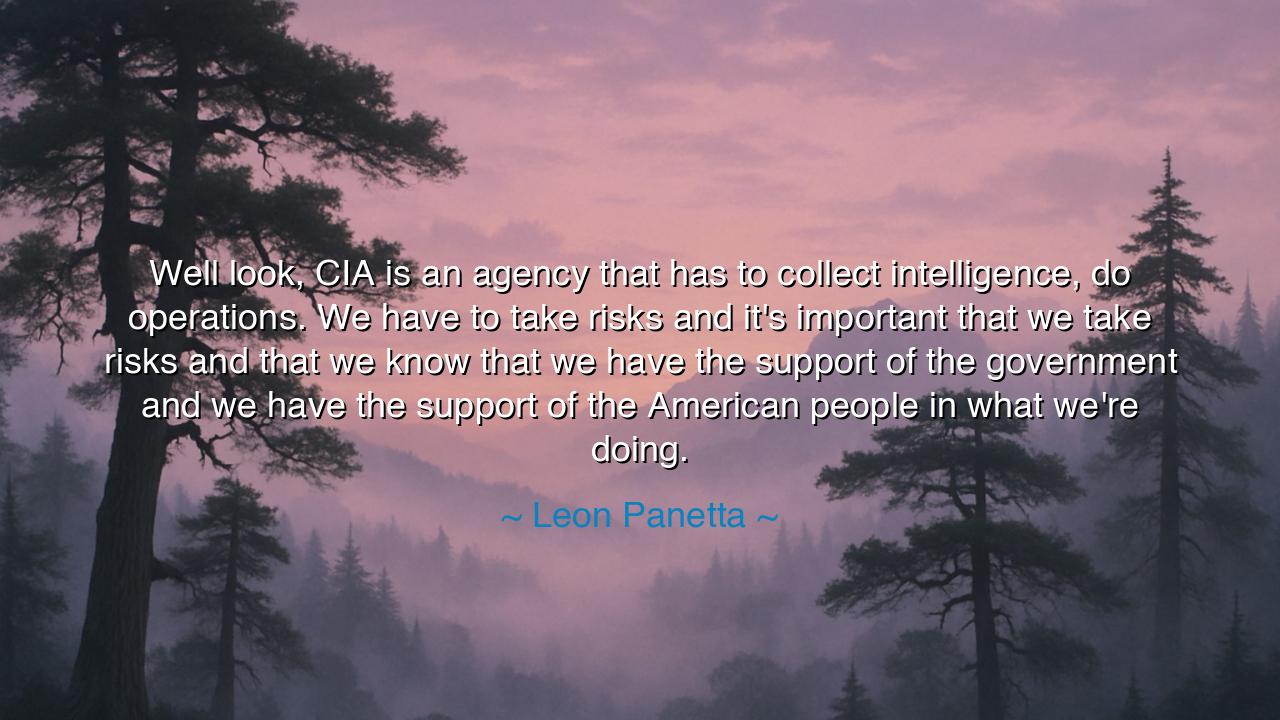
Well look, CIA is an agency that has to collect intelligence, do
Well look, CIA is an agency that has to collect intelligence, do operations. We have to take risks and it's important that we take risks and that we know that we have the support of the government and we have the support of the American people in what we're doing.






The words of Leon Panetta, forged in the crucible of duty and service, speak with the quiet gravity of one who has stood at the threshold of secrecy and sacrifice: “Well look, CIA is an agency that has to collect intelligence, do operations. We have to take risks and it's important that we take risks and that we know that we have the support of the government and we have the support of the American people in what we're doing.” In this statement, there resounds an ancient truth—the truth that courage without support is fragile, and that those who guard the unseen borders of a nation stand not only upon their own valor, but upon the faith of those they serve. Panetta’s words, though spoken of the modern world of espionage, echo the eternal principle that trust and unity sustain all guardians of civilization.
Leon Panetta, as Director of the Central Intelligence Agency, led an organization whose work lived in shadow but whose purpose burned with light—to protect, to foresee, to prevent. In speaking of risk, he revealed the moral essence of intelligence work: that to preserve peace, one must sometimes walk through peril. Yet, even as he affirmed the necessity of daring action, he called upon a greater foundation—the support of the government and the people. For what is the worth of courage if it is unrecognized? What is the strength of an institution if its own nation doubts its purpose? Panetta reminds us that even the most secret warriors cannot act alone; their integrity depends upon the faith of the society they defend.
From the earliest days of civilization, those entrusted with intelligence and defense have carried a burden that others cannot see. In the courts of ancient kings, there were the scouts, the spies, and the advisors—men and women who ventured beyond the known to gather truths that would save kingdoms. They risked their lives not for glory, but for knowledge. Yet even then, their work required more than courage; it required the confidence of their rulers, the belief that their unseen deeds were worthy. When such trust was lost, nations fell—not for lack of skill, but for lack of faith between protector and protected.
Consider the fate of Jeremiah the prophet, in the final days of Jerusalem. He warned the leaders of what was coming—he had, in his way, gathered “intelligence” from the divine. But his warnings were ignored; the rulers mocked him, and the people reviled him. Without trust in their watcher, they perished. In this, we see the same eternal pattern that Panetta spoke of: that truth and vigilance mean nothing if the people turn away from them. The guardians must have the trust of those they guard; otherwise, their risks become burdens too heavy to bear.
When Panetta speaks of the CIA’s duty “to take risks,” he touches upon the very heart of service. To take risks for others is the noblest act a human can undertake. But risk, in isolation, is not heroism—it is despair. Only when one takes risk for a cause supported by others does it become sacrifice. And that is what he reminds us: that the intelligence community, and by extension every person who serves, thrives only when it acts in harmony with the will and faith of the people. Mutual trust is the invisible armor of every nation; without it, even the strongest institutions crumble.
The story of Operation Neptune Spear, the mission that brought down Osama bin Laden under Panetta’s leadership, embodies this truth. It was a mission of immense risk—unknowns, dangers, and global consequence. Yet it succeeded not only because of skill, but because of the confidence and unity that flowed from leadership to soldier, from government to operative, from people to mission. The silent operators who carried out the task knew that their actions had the blessing of a nation—that their risk was understood, their purpose clear. It was this unity of trust that gave strength to courage and turned peril into victory.
Panetta’s words, then, are not confined to the halls of intelligence—they speak to all who bear responsibility, who must make choices unseen by others. Whether one leads a nation, a household, or a solitary life, the lesson remains: no great endeavor can endure without faith and support. The doer must act with courage, but the watcher must believe. The one who serves must risk, but the ones served must stand behind that service with gratitude and understanding.
So take this teaching to heart, O listener. When others take risks on your behalf—whether soldiers, teachers, parents, or friends—stand with them. Offer your trust, your respect, your acknowledgment. And when you yourself are called to act boldly, seek not applause but the quiet assurance that you serve something greater than yourself. For the world endures not through power alone, but through the sacred bond between those who risk and those who believe.
Thus, as Leon Panetta reminds us, the courage to take risks must walk hand in hand with the trust of the people. Only then can nations, families, and souls move through danger toward the dawn of safety and peace.






AAdministratorAdministrator
Welcome, honored guests. Please leave a comment, we will respond soon